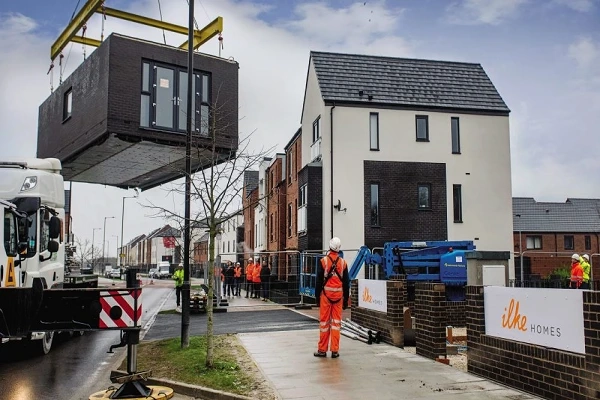As average UK house prices continue to hit unprecedented highs, more would-be buyers are being priced entirely out of the market. Meanwhile, housebuilders are finding it impossible to keep up with skyrocketing demand for affordable homes.
The need for innovative housing people can actually afford is motivating more businesses than ever before to make their mark on the UK housing sector. John Lewis recently announced an ambitious plan to build around 10,000 rental homes in the South East, while IKEA is set to swap flat-pack furniture for affordable green home building.
But what is making even bigger waves in the housing sector right now is talk of an imminent and perhaps revolutionary switch to modular housing. With the government having made the lofty commitment to build at least 300,000 new homes per year by 2025, it is clear that the conventional approach to house building simply isn’t going to work.
The question is, is prefabricated housing a realistic concept? If so, to what extent, could it make a difference to the country’s rapidly escalating housing crisis?
What Are Prefabricated Houses?
As the name suggests, prefabricated homes are those that are built primarily off-site. It has been a popular approach in retail and hospitality for decades, where everything from restaurants to garages is essentially ‘delivered’, rather than being built from the ground up.
Large prefabricated components arrive at the prepared site, and are put together by the assigned workforce as promptly as possible.
In the past, modular housing (and prefabricated construction in general) was associated with fairly basic properties. The resulting structure was often far from luxurious, and came with a notable ‘synthetic’ quality.
Today, advances in construction technology mean that prefabricated homes can be not just comfortable, but highly customisable, sophisticated and energy-efficient. All with the added bonus of being significantly cheaper than their conventional counterparts.
What Are the Benefits of Modular Housing?
Modular homes are being widely touted as a potential solution to the UK’s housing crisis for the following reasons:
They are significantly quicker to build
On average, it takes approximately 32 weeks to build a new home from scratch. By contrast, it is possible to assemble a modular home in as little as two days. Exact project completion times vary from one property type to the next, but modular housing, in general, is exponentially quicker to build than any conventional home.
A solution to the skills gap
The fabrication of modular home components is largely automated, using a combination of sophisticated robotics and computer software. When the components arrive on-site, they can be assembled with relative ease. Not only does the process call for a much smaller workforce, but also a workforce without advanced construction skills.
Massively reduced construction costs
Modular housing is effectively a mass-production approach to the construction of new homes. Scalability and significantly reduced material costs result in massively lower overall build costs. Such savings can be passed on to the customer, potentially providing more first-time buyers than ever before with the opportunity to own their own homes.
Fewer delays and disruptions
Last up, most of the work involved in constructing a modular home takes place in a controlled factory setting. This means that adverse weather conditions and other common construction site disruptions can be eliminated from the equation. There is also a significantly reduced labour requirement, making delays and disruptions attributed to labour shortages far less likely.
Of course, the modular housing sector has not yet reached a viable size or capacity to completely transform the face of UK housing. Nevertheless, there are those who believe that the modular housing revolution is a case of when, rather than if.
For more information on any of the above or to discuss bridging finance in more detail, contact a member of the team at UK Property Finance today.
0


